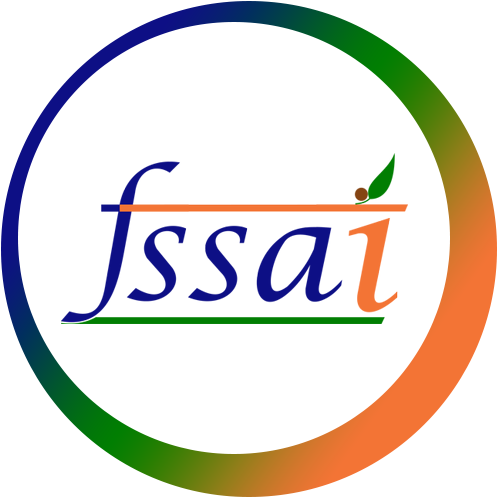Registration
-
Manufactures or sells any article of food himself or a petty retailer, hawker, itinerant vendor or temporary stall holder; or distributes foods including in any religious or social gathering except a caterer.
-
Such other food businesses including small scale or cottage or such other industries relating to food business or tiny food businesses with an annual turnover not exceeding Rs 12 lakhs and/or whose
-
Production capacity of food (other than milk and milk products and meat and meat products) does not exceed 100 kg/ltr per day or
-
Procurement or handling and collection of milk is up to 500 litres of milk per day or
-
Slaughtering capacity is 2 large animals or 10 small animals or 50 poultry birds per day or less
Documents required while applying for a Registration: -
- Application in Schedule-1
- Address proof (Government documents like Voter ID card)
- Photograph of applicant
-
Registrations are granted by the Registering Authority who may be Designated Officer/ Food Safety Officer or any official in Panchayat, Municipal Corporation or any other local body or Panchayat in an area, notified by the State Food Safety Commissioner.
-
Dairy units including milk chilling units equipped to handle or process morethan 50,000 litres of liquid milk/day or 2500 MT of milk solid per annum.
-
Vegetable oil processing units and units producing vegetable oil by the process of solvent extraction and refineries including oil expeller unit having installed capacity more than 2 MT per day.
-
All slaughter houses equipped to slaughter more than 50 large animals or 150 or more small animals including sheep and goats or 1000 or more poultry birds per day.
-
Meat processing units equipped to handle or process more than 500 kg of meat per day or 150 MT per annum.
-
All food processing units other than mentioned under (I) to (IV) including labellers and repackers having installed capacity more than 2 MT/day except grains, cereals and pulses milling units
-
100 % Export Oriented Units.
-
All Importers importing food items including food ingredients and additives for commercial use.
-
All food business operators manufacturing/ processing/ importing any proprietary food for which NOC has been given by FSSAI.
-
Registered/ Head office of FBOs operating in two or more states.
-
Food catering services in establishments and units under Central government Agencies like Railways, Air and airport, Seaport, Defence etc.
-
Hotels with 5 star and above accreditation.
-
All E-commerce food businesses.
-
All grains, cereals and pulses milling units [All other food business operators which are not covered under registration and central licensing are covered under state licensing]
Documents to be enclosed with application for License (to Central / State Licensing Authority):
(The list is only indicative, not mandatory unless mentioned)
- Form-B duly completed and signed (in duplicate) by the proprietor/ partner or the authorised signatory (mandatory for all categories).
- Blueprint/layout plan of the processing unit showing the dimensions in metres/square metres and operation-wise area allocation (mandatory for manufacturing and processing units only).
- List of Directors with full address and contact details (mandatory for companies only)
- Name and List of Equipments and Machinery along with the number, installed capacity and horse power used (mandatory for manufacturing and processing units only).
- Photo ID and address proof issued by Government authority of Proprietor/Partner/Director(s)/Authorized Signatory. (optional).
- List of food categories desired to be manufactured. (In case of manufacturers).
- Authority letter with name and address of responsible person nominated by the manufacturer along with alternative responsible person indicating the powers vested with them viz, assisting the officers in inspections, collection of samples, packing & dispatch. (mandatory for manufacturing and processors).
- Analysis report (Chemical & Bacteriological) of water to be used as ingredient in food from a recognized/ public health laboratory to confirm the portability (mandatory only for manufacturing and processing units only).
- Proof of possession of premises. (Sale deed/ Rent agreement/ Electricity bill, etc.) (optional).
- Partnership Deed/Affidavit/Memorandum & Articles of Association towards the constitution of the firm. (optional).
- Copy of certificate obtained under Coop Act - 1861/Multi State Coop Act - 2002 in case of Cooperatives. (wherever applicable).
- NOC from manufacturer (mandatory for Re-labellers and Re-packers)
- Food Safety Management System plan or certificate (if any).
- Source of milk or procurement plan for milk including location of milk collection centre’s etc. in case of Milk and Milk Products processing units(wherever applicable).
- Source of raw material for meat and meat processing plants. (wherever applicable).
- Pesticide residues report of water in case of units manufacturing packaged drinking water, packaged Mineral water and/or carbonated water from a recognized/ public health
- Recall plan wherever applicable, with details on whom the product is distributed. (Optional).
- NOCs from Municipality or local body. (Optional).
Food products standards laid down by FSSAI needs to be followed for each product category being manufactured and sold in Indian market.
Food License and Registration System (FLRS) is an online platform where investors can apply for license/registration and can track their application during the course of processing. Registration portal - https://foodlicensing.fssai.gov.in/about_flrs.aspx






